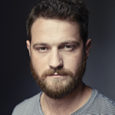In 1991, it was clear that the end of Albania’s communist regime was approaching. In that year, the last political prisoners who were sentenced by Enver Hoxha’s dictatorial regime were released. Among them was Fatos Lubonja, a man who was imprisoned at the age of 23, together with some of his relatives, and who had spent 17 years in prison.
Upon being set free, Lubonja served as the general secretary of the Albanian Committee of Helsinki — an organization that deals with human rights issues — up until 1993. A year later, he established Përpjekja (Attempt), a magazine which continues to be published to this day.
For Lubonja, writing was one of his means of escaping the desolation of prison. “It came naturally, as a need, and as a duty to share evidence of that dark reality,” he explains. In 1994, he published “Ploja e Mbramë” (“The Final Slaughter”), which he wrote on tobacco rolling papers during his time in prison.
Engaged in public life since the ’90s, he continues to write to this day. Lubonja is one of the most renowned figures among Albania’s publishers. Known for his humanist beliefs, he openly opposes nationalism. Through his public activism he has clashed with all political parties in Albania, whereas through his opposition towards nationalism he has also confronted Kosovar political leaders.
Although he has been part of the media for more than two decades — both through his own magazine and as a regular analyst for other media — Lubonja regularly criticizes it, seeing it as one of the power structures responsible for the situation in which Albania finds itself.
K2.0 spoke to Lubonja about topics including the role of intellectuals, nationalism, “economic fascism,” and critical thinking and action.
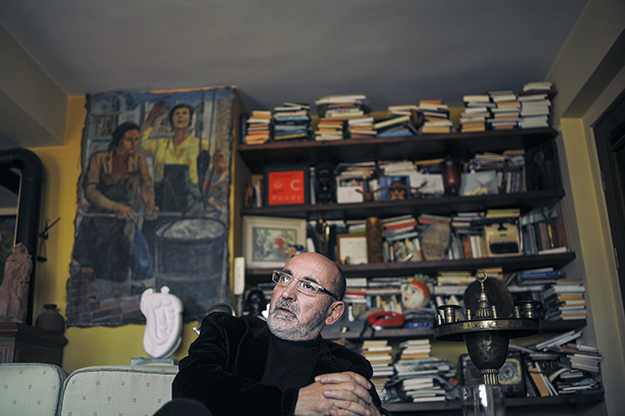
Photo: Atdhe Mulla / K2.0.
K2.0: What is an intellectual to you? What do you believe to be the role of the intellectual in society?
Fatos Lubonja: The definition of an intellectual differs from that of a professional. We are professionals for as long as we work as writers, scientists, teachers or whatever else, in our profession. We become intellectuals when we reach the public and speak for the public. Take the example of Einstein: When he was working on his scientific studies, he was a scientist, but he became an intellectual when he raised his voice for different issues, such as against nuclear warfare.
Another example is that of French intellectuals such as [writer] Emil Zola, who spoke about the Dreyfus Affair. It is a classic example. Scientists and other renowned figures got together to defend Alfred Dreyfus [a captain in the French military who was falsely accused of collaborating with the Germans at the end of the XIX century in a case that sharply divided French society].
At the end of the day, it’s not that this definition covers everything. I find it hard to make distinctions between an intellectual, a human, a citizen. But if we are to give this kind of attribute to a person who has more intellectual instruments, culture, knowledge, empathy, then you can be more demanding of him or her. You can be more demanding regarding empathy, the sense of justice, or the sense of indignation as a result of some evil. But maybe also regarding the courage to say things, because an intellectual must be very courageous and go beyond him or herself in the name of public interest. This requires courage and not the human egoism that finds shelter in interest.
At the same time, I believe that [an intellectual] must give a vision to the world, must have a bigger influence than others in order to give a sort of direction to the world. They must also fight more for what is moral. But then again every person must be like this. However, it makes more sense to seek these things from intellectuals.
You mention empathy, indignation, vision of the world and courage as attributes of intellectuals. In the context of current globalism trends and their relation to the slogan “everything that can be sold, can be bought,” what is the role of the intellectual in today’s world?
I mentioned one other attribute which is key: Intellectuals also have the duty to work toward making people more knowledgeable. I run a magazine, the main motto of which is “be knowledgeable to be free,” a Latin proverb. The objective of this magazine is to cultivate a critical spirit in Albanian culture. It is the ability to be sceptical, to see certain realities, dominant cultures and power ideologies from a critical viewpoint.
"If I were to explain it in one word, that word would be ignorance. People are incognizant."
Regarding your question about what role an intellectual should play in the face of phenomena such as globalization — which is mainstream in today’s world — I believe that it is the ability and duty to analyze it in a critical way. We must view the problems that come as a result of globalization in a critical way. We must highlight them, and suggest alternatives for improvement, for change and for opposition.
That slogan has nothing to do with intellectuals because their foremost duty is not to be bought, in the sense that their opinions must not serve certain power structures, rather they must be free in their thinking, so as to serve the public.
You mentioned the dominant culture, and the intellectual as someone who thinks, believes and lives differently, not in accordance with the dominant norms of society. What approach do Kosovar and Albanian societies have toward intellectuals?
In general, our society was and has remained a society that greatly conforms to the mainstream. We come from the culture that was labelled as “popular intelligence” by Enver Hoxha’s regime, one which has a different approach toward intellectuals, as we defined earlier, because it views them as levers of power. In a communist vision of the world, “popular intelligence” was not there to criticize, rather it served only to realize this vision — so it was fused with the party.
This is a theoretical sense that can be seen as a way of changing the world. At least at the time when communist parties first emerged, intellectuals were figures who believed in the party and were unified by it, as well as figures who would sacrifice themselves for it, and so on. But in a banal sense, this reduces intellectuals to people who serve the power structure and benefit from it. Instead of criticizing power structures, they are its servants in many forms.
Social realism had this character. The service was not only in the form of propaganda, but also through acting in the spirit of that ideology and benefiting from the power structure. This was the model and it has remained as the model that created intellectuals even after the communist era. Because of this heritage, and the need to survive in the capitalist era — in which power comes from money and enslaves people — they became conformist intellectuals in the dominant culture.
The issue is not only with politics. For example, the vision we have for history, for ourselves, our neighbors, etc. comprise the dominant culture. At one point it was national communism, now it is nationalism, pride, identity, hatred toward others. All these are part of the mainstream, and often intellectuals join this trend instead of opposing it, because of personal gains.
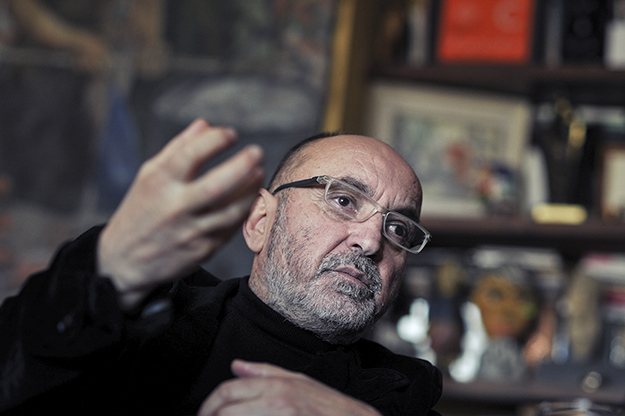
Photo: Atdhe Mulla / K2.0.
Let’s speak about the communist era. You spent 17 years in prison under Enver Hoxha’s regime. During your time time in prison and your 30 years of freedom, have you managed to figure out why people can be so cruel toward other people?
It is a difficult question, the answer to which would become a novel in itself. But if I were to explain it in one word, that word would be ignorance. People are incognizant. And I am not referring only to scientific or rational knowledge, but also emotional knowledge… the spiritual and moral side of humans. When a person lacks these, they are likely to be cruel to others and to embrace an idea. For example, cruelty can also come as a result of fanaticism. When you think that the truth is on your side and that all others are wrong, then you place yourself in the world of your truth, without acknowledging other opinions, other worlds, other religions.
Religious fanaticism is also like this, because people become cruel when they believe in something deeply. However, undoubtedly this is dead faith, which often makes people cruel. As does a lack of empathy, the inability to put yourself in someone else’s shoes, to understand someone who is in a situation of pain. This also often comes from ignorance, because to develop your empathetic side is to develop your imagination by reading books, etc. It awakens you in a world in which you see others, you put yourself in their shoes and you experience their feelings. It is very complex.
What is the role of ideology in this regard?
To be more concrete about the reality we have experienced: People become cruel because they strip themselves of responsibility by holding others responsible; by simply being someone else’s soldier. That makes people ready to kill, because they have been ordered to do so and thus have no moral sense to say “No, I will not do this despite being ordered to.” Ignorant people, submissive people who are in a system and lack personality and responsibility, can become cruel very easily. All those wardens who tortured us in jail were not simply fanatics, they were also soldiers who followed orders because they did not develop their own personalities.
"Economic fascism implies the violence that is inflicted by a minority to protect its interests in relation to the majority, the others."
The issue of stripping people of cruelty is also related to that of giving people knowledge and developing responsibility in relation to others. This is also related to people’s freedom, because one can say “I was not free, that is why I did it,” and in a sense they could be right. So you have to develop a society in which people are free and responsible, and are not just puppets that follow every order.
You have continuously spoken about “economic fascism.” Can you elaborate more on this thesis? According to you, is this happening only in the context of the Balkans, or also in a wider context?
It is definitely in the global context. I did not coin this term. The “economic” part of the term implies that it is different from classic fascism, if we can call it that. Mussolini’s fascism and Hitler’s Nazism differ from what we call economic fascism. It stemmed as a movement against capitalism during the economic crisis of the ’20s. It was called national socialism and it highlighted nationalism, national interest, egoism among nations, and in a way it had policies that we can describe as social in the name of the nation.
Economic fascism implies the violence that is inflicted by a minority to protect its interests in relation to the majority, the others. It is the need to protect economic interests of a certain class that harbors power — which we can call an oligarchy. The common element that it has with fascism is violence.
Violence has its different forms, because violence is not necessarily physical. Violence also comes through media and verbality. Unlike Hitler’s extreme right wing policies, which are related to the nation, pride and conquests, [Italian philosopher] Norberto Bobbio describes them as characterized by violence exercised by a minority to protect their interests in relation to the majority and to preserve inequality.
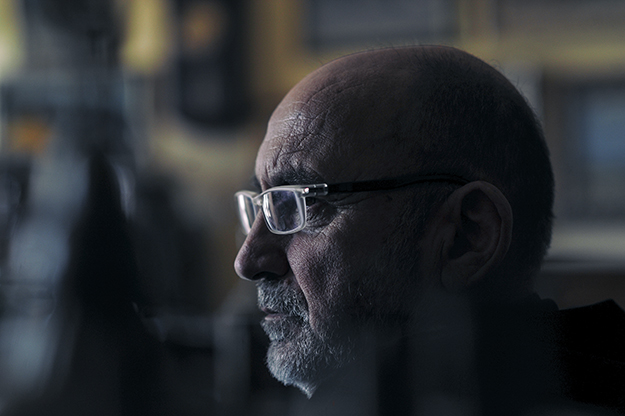
Photo: Atdhe Mulla / K2.0.
So can we say that poverty is a key issue in our society?
We must understand whether poverty is the main issue or whether it stems from ignorance. Only then can we change the situation. I don’t think it’s so simple, in that there is only one issue, because we are not that poor if we compare ourselves with other countries. We have a huge problem, in that we lack a social dimension, the ability to create a society in which people are responsible toward each other. You can find this even in poor societies. They have solidarity, they are unified, despite being poor. They are often unified by religion, because they want that sense of equality in their midst. “We are all equal before God,” they say.
I do not believe this and I am not a believer, but this is important. This is the biggest flaw among Albanians: their inability to unify, to feel responsibility toward one another. I think that this is a historical flaw, a lack of religion. They were ignorant, and it is not a coincidence that for the most part, our society had the Kanun as law. What is the Kanun? Ultimately, it is a society before the state. It regulated our relations since we were unable to build a mechanism to which we delegate responsibility. We solve problems with one another. You kill me, I kill you. It is a tribal society, in which tribal and familiar egoism dominates everything. We were like this up until late, and we have lacked the mechanisms to be unified beyond this.
Communism was imposed through violence, because communism and nationalism aim to go beyond individual and familiar egoism, but they were unsuccessful. Thus we didn’t build a state or a society. I think this is the main problem that then leads us to poverty, because poverty stems from the inability to be organized. Big things are done through team work, not on an individual basis.
We do not build a big house, we only build our own houses. On every rooftop there is a water tank. What does this show? It shows our inability to unify and make a water supply system, if we look at it in the figurative sense. If we were to put all our money together, we would probably have a water supply system that functions 24/7. So it is not just about poverty. They have the little money it takes to get a water tank, but they are unable to trust each other… and the administrator they give the money to steals it for the greater good. This is the problem. We do not work for the common good.
Speaking about Albanians, we cannot evade the prevailing debate about the unification of Albanians, and the identity of Albanians of Kosovo and Albania. In Kosovo they speak about building a national Kosovar identity. We know your stance on nationalism. Could this be a new nationalism?
Nationalism and identity are not two things that can be identified because nationalism is often an abuse of identity; however, in the sense that nationalism above all is national pride and hatred for the other. When you deem your identity — defined by language, history and other elements — to be superior in relation to others, that is nationalism.
But that is not to say that you must not have an identity. But let’s talk about what identity is, what defines it. I was and am against the idea of an identity. We have many identities as beings; you have the regional identity, the religious identity, the professional identity — many. People must be aware of this. In fact, we can reach a point where we are against the identity. Because often an identity is used to classify you, to reduce you. If a Serb says “he/she is Albanian,” it implies one, two or three bad things according to him or her. Or if an Albanian says “he/she is a Serb,” it implies one, two or three bad things according to him or her. When I label you, I have reduced you as a human being who has a profession, and is European, and could be a good or bad person. Simply put, there are a thousand things that could characterize you.
"The biggest risk is going toward an identity and trying to manipulate people with it."
Regarding your question: Is a Kosovar identity being built? Could this be a form of nationalism? Or should we not build a Kosovar identity, because we are Albanians and as such there is no need to speak about an identity that segregates us from Albania because we have a vision of unifying with Albania? etc.. These are open subjects and I do not have an answer for them.
But if we see people as having multiple identities, then it is absurd to say that being Kosovar and being Albanian is the same thing. It could be the same thing since we speak the same language, but there are differences between the two, as there are differences between a person who is from Korça and a person who is from Shkodra. If we say that people have multiple identities or are aware that it is so complex, then maybe this debate wouldn’t be so prominent. Because the biggest risk is going toward an identity and trying to manipulate people with it.
If the Kosovar identity is used as a counterpoise to Albanian nationalism, could it ultimately become a form of nationalism?
If we perceive it as such, it can be a form of nationalism. As I said, identities can be manipulated, such as by building a Kosovar identity only to preserve power [in Kosovo]; they might fear that by unifying with Albania they could lose power.
Kosovo’s issue is more complex, because when we talk about identity we imply the nation state: ‘Will we build our own state or will we unify with Albania?’ These are two different projects. Statebuilding is a project that also implies national identity. Because your identity is defined by your nationality — according to the concept of the nation state. If the state defines your national identity, then Kosovars must be different from Albanians, just as Macedonians are different from Kosovars or Albanians, despite the fact that they are Albanians of Macedonia. It is more or less the Swiss model.
Here, this is yet to be resolved. We have not reached an agreement yet because we still have the project of building Greater Albania and we have not become subjects of the nation states that have been established in the Balkans. This is alro related to our vision of the world. Moreover, it is related to international conjunctures, because our states were created as a result of their wishes.
Take for example Arab states. They [internationals] said ‘Here is Iraq, here is Syria’ — which was a big nation previously, but no longer is because they segregated it and created different identities. Whether Kosovo’s history will start like this, or whether it will unify with Albania to fight this idea, this is an issue of willingness, but also one which is influenced by international conjunctures.
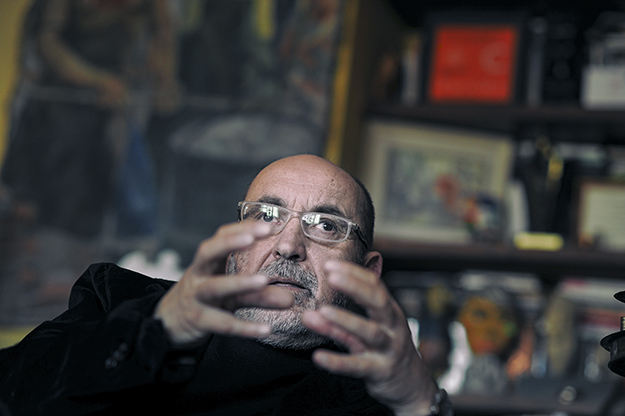
Photo: Atdhe Mulla / K2.0.
Through the years you’ve been a proponent of humanism. You’ve claimed that social change stems from the democratic process and you have been categorically opposed to violence. Lately, regarding political developments in Albania, you’ve spoken about “dragging the prime minister out of his office,” or “civil revolts to stop the catastrophe.” Have you changed your discourse? And if so, why?
Humanism puts people and their freedom as protagonists in history at the center, and in this sense, I am a humanist. I do not believe that God defines our path. People define their own path. As [Austrian-British philosopher] Karl Popper said: “The future depends on us, and we do not depend on some historical necessity.” So people define the future. People learn. There is no determinism. But what we do depend on is historical experiences, on what we learn from the past.
Of course when we speak against violence, one of the most important things to note is that violence breeds violence, and that nothing is solved by using violence. Not to say that that is all we have learned from experience, because in some cases I say that they [political leaders] should not be allowed to go to their offices. When I say dragging, I am not implying to kill them — because I am against the death sentence — but to drag them out of the office. But there is an old saying: “When words are missing, the dick makes the judgements.” People reach extreme situations sometimes, because ultimately, even when we imprison someone, we are using violence.
Have we reached this point?
I think so. I think that when you have a prime minister who lies every day, steals from his people every day… protesting through not letting him go to his office seems like a beautiful thing. If only the people were able to rise and say: “You cannot enter your office today. We’ve blocked the entrance and this office needs a different type of person.” I don’t know how it is in Kosovo in this regard.
You might say, but what are free elections then? Ultimately, you must preserve democracy, because whoever comes to power by using violence could use violence while in power as well — this has been proven to us throughout history. Beyond this rhetoric, the truth is that the possibility of rotation [of power] has been eliminated here [in Albania].
I read a statement that was made by your Prime Minister, [Ramush] Haradinaj. When Lista Srpska left the government [in April 2018] and the majority was lost, he said: “I will not leave the government.” What is this? Is this not violence? I don’t know what you call it, but I call it violence. The idea is that the possibility of rotation through free elections has been lost. Not because he uses violence, but because now he has captured all power structures — economic, media and criminal power structures. With their money, with their power, they create a majority, a form of Putinism, in which the opposition exists, but never has the possibility to come to power. That is the situation.
I’ve compared our power system with a three-storey building. On the first floor is the oligarchy, on the second is the media, and on the third are the policies that are built by the offices of the majority and opposition. In the basement, there is organized crime. And there are stairs or elevators that connect these floors.
Do we change it by dragging people or through other forces of resistance? I think resistance should be peaceful and must not go to the extreme, to using violence, to killings. However, civil disobedience must not be excluded as a form. In this aspect, I used the term dragging. They ruin our [cultural heritage sites], our theater, because “I’m going to build seven buildings, and I will not ask anybody.” They don’t bring anyone to debate on TV about these things because they say: “It’s not important. I won’t debate because we’ve already reached a decision.”
The unfortunate thing is that the people are submissive. If they weren’t, there would be no need to drag anyone. That expression that I used was one of desperation. If the people gather and protest, that is sufficient. En masse opposition has an influence. This prime minister wanted to bring chemical weapons here [in 2013, Edi Rama’s government approved a project for dismantling the chemical weapons of the Syrian regime, in Albania]. People got together and ousted even the opposition [from the protest]. That would be the form, but among submissive people you only get cries of desperation.
You are critical toward the way the media is functioning these days in Albania. You’ve accused them of being servants of politicians, and of changing sides whenever there is a shift in power structures. On the other hand, for more than two decades, you have been a part of the media yourself. Nevertheless, you’ve said that you have tried not to be on anyone’s side, but rather to push forward your ideas and convictions. Do you have some responsibility for either affirming and popularizing the media, or for your presence within the media allowing media organizations to give the impression that they are promoting critical voices?
I’ve criticized this system and I don’t mean that the media follows whoever is in power. I’ve said something that is worse. I’ve compared our power system with a three-storey building. On the first floor is the oligarchy, on the second is the media, and on the third are the policies that are built by the offices of the majority and opposition. In the basement, there is organized crime. And there are stairs or elevators that connect these floors. Change happens only in the highest offices — when the head of the opposition becomes prime minister — whereas the power in the ones below does not change.
In a democracy, the basement should be a prison, the first floor should be the economy and free market, media should be independent and political power divided among the legislative, the executive and the judicial branches. They’ve put the judicial branch in a room on the third floor. The media have become a part of the triangle: financial power, political power and media power. This is the system that reigns over Albania. Sometimes I’ve referred to it as a media regime. Because it is a regime that uses the media, instead of the police force, to manipulate and brainwash people, and to hide many truths. The media is mainly run by builders. For example, they never speak about the destruction of the coastline.
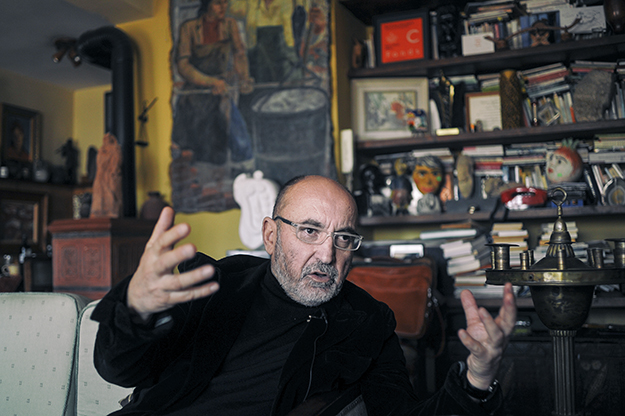
Photo: Atdhe Mulla / K2.0.
What is your role in all this?
Am I responsible? Of course I am. It is a metaphysical responsibility, as [German psychiatrist and philosopher Karl] Jaspers puts it. But not just that. In such a situation, we are all responsible. Each one of us must think that we have not done enough to prevent this evil. If you think, “Oh, I’ve done everything I could. You are to blame,” that’s when things start to go wrong.
I’ve often thought that we need to build alternative media, or that we need to discuss within this system. Can you transform it when you are outside of it, when you do not deal with it at all? Or by using instruments, the ones that are at our disposal, to bring about change? There are people who say that this is the system and that it is fine, and there are others who say that it is not right and that it needs to be changed.
How do you change the system? That is an philosophical issue. Do you run or do you stay and fight? The argument is that within the concept of media in a democracy, as we claim, there is the right to advertise, which is regulated by law. These advertisements are not done to enrich media owners, but to give people the chance to speak. That is how it is in principle, although they abuse this. If you speak against a certain someone, they fire you.
I have insisted on doing something different. Seeing that media owners abuse this freedom and the media market is not regulated as per the free market, but rather is influenced by personal interests, I’ve proposed to strengthen the public television. But the bad thing is that in a country in which the ideas of those who achieve power and control everything are dominant, the public television is even more controlled — only it is controlled by the government, not private individuals. Private media owners have different interests, thus they offer a bit more space. I would go with public television, but not one that is controlled by Edi Rama. Here we see how we must change the system.
How?
The most successful way would be by creating media that are not financially dependent on people who have conflicts of interest. Media that are not owned by builders — people who use the media to get building permits, not to inform the public. We are in this system and we are all responsible, and the only condolence is that I have one leg inside the system, and with the other I am kicking it [the system]. But even I am responsible for this situation, and I have not done enough, even though I’ve spoken against these media, despite being a part of them.
"In principle, I am a proponent of the idea that you must fight the system from within. If you leave the system, you are inexistent."
But that is not sufficient. The idea is, who exploited more? Did they exploit you, or did you exploit them more? It’s a valid question. If there were more journalists speaking against the construction projects — for example I have criticized them despite the fact that the media owners were builders themselves — it would close the media. This shows us that people must be unified if they want to change the system. It takes a lot of people to bring about change, because if they [media owners] hear only one voice, they’ll say, ‘I’ll keep it as a contorno’ [Italian for side dish]. But if all editorial policies were against one, two or three development projects, they would no longer work with construction, and their media would survive depending on the market.
In principle, I am a proponent of the idea that you must fight the system from within. If you leave the system, you are inexistent. But in Albania — and I believe in Kosovo too — it is very difficult to change the system. K
This conversation has been edited for length and clarity. The interview was conducted in English.
Feature image: Atdhe Mulla / K2.0.






